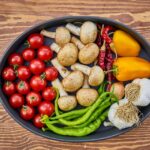As women, our periods can be a source of frustration, pain, and confusion. We often wonder why our cycles are irregular or why we experience certain symptoms. One factor that many of us overlook is our diet. Can what we eat really affect our periods? The answer is yes, and the link between diet and menstruation may surprise you.
First, it’s important to understand how our menstrual cycle works. Our bodies rely on a delicate balance of hormones to regulate our periods. When our hormones are out of balance, it can lead to irregular cycles, heavy bleeding, and other issues.
Now, let’s talk about how our diet can impact our hormones. Certain foods can either promote or disrupt hormonal balance. For example, foods high in sugar and refined carbohydrates can cause insulin levels to spike, which can throw off our hormone levels. On the other hand, foods high in healthy fats, like avocado and nuts, can help regulate hormones.
Here are some specific ways that diet can affect your period:
1. Weight:
Maintaining a healthy weight is important for hormonal balance. Being overweight or underweight can disrupt your menstrual cycle. Eating a balanced diet and getting regular exercise can help keep your weight in check and promote a healthy menstrual cycle.
2. Iron:
Iron is an essential nutrient for women, as we lose iron during our periods. Eating foods high in iron, like spinach and red meat, can help replenish these stores. Low iron levels can lead to heavy bleeding and fatigue.
3. Dairy:
Some studies have found that consuming dairy products can lead to higher levels of estrogen and progesterone, which can regulate menstrual cycles. However, other studies have found that dairy can also contribute to inflammation and hormonal imbalances. It’s best to listen to your body and see how dairy affects your period.
4. Soy:
Soy contains phytoestrogens, which are plant compounds that mimic estrogen in the body. Some women find that consuming soy products, like tofu or edamame, can help regulate their menstrual cycles. However, others may find that soy disrupts their hormones.
5. Caffeine:
Caffeine can disrupt hormonal balance and lead to menstrual irregularities. It’s best to limit your intake of caffeine during your period and throughout your cycle.
In conclusion, what we eat can have a significant impact on our menstrual cycles. Eating a balanced diet that includes plenty of fruits, vegetables, healthy fats, and lean protein can help regulate hormones and promote a healthy period. Pay attention to how your body responds to certain foods and make adjustments as needed. By making simple changes to your diet, you can improve your menstrual health and overall well-being.




